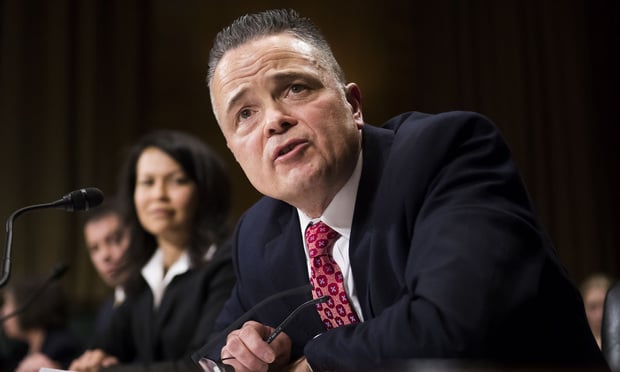US Justice Department Opens New Front Against EEOC
The U.S. Justice Department told the Fifth Circuit that the department disagrees with a part of the guidance from the EEOC that confronts employer consideration of the criminal histories of job applicants. The clash is the latest between the agencies.
September 06, 2018 at 10:45 AM
5 minute read
The original version of this story was published on National Law Journal
 Joseph “Jody” Hunt testifies before the Senate Judiciary Committee during his confirmation hearing to assistant attorney general for the Civil Division at the U.S. Department of Justice, on March 7, 2018. Photo Credit: Diego M. Radzinschi/ALM
Joseph “Jody” Hunt testifies before the Senate Judiciary Committee during his confirmation hearing to assistant attorney general for the Civil Division at the U.S. Department of Justice, on March 7, 2018. Photo Credit: Diego M. Radzinschi/ALM
The U.S. Justice Department in a federal appeals court has disavowed Obama-era guidance that discourages employers from flatly rejecting job applicants who have criminal histories, marking the latest clash with the U.S. Equal Employment Opportunity Commission.
The Justice Department's brief, filed late Wednesday in the U.S. Court of Appeals for the Fifth Circuit, was submitted on behalf of the EEOC in a lawsuit Texas brought against the agency over its criminal-history guidance. That 2012 guidance confronted blanket policies that disqualify job candidates for past criminal convictions. A trial judge blocked enforcement of the guidance against Texas, and the Justice Department took the case to the Fifth Circuit.
The new clash marks the latest public disagreement between the Justice Department and the EEOC, which still has an Obama-appointee majority. Last year, the Justice Department lined up against the EEOC in the Second Circuit, arguing that federal civil rights protections do not extend to gay and lesbian workers. Two Trump nominees are pending for the EEOC.
In the Fifth Circuit case, the Justice Department is not abandoning the appeal. The government contends Texas does not have standing to sue the EEOC over its guidance because it is not a final agency action.
The Justice Department told the Fifth Circuit the government would not enforce the guidance, therefore there are no “legal obligations or consequences on Texas or any other employer.”
“Neither the Department of Justice, nor any other government agency is bound by the guidance,” said the Justice Department's legal team, under the leadership of Joseph “Jody” Hunt, the newly confirmed head of DOJ's Civil Division. “To the contrary, the department's analysis of disparate impact claims in the context of criminal history records differs in a number of respects from that of the (EEOC) guidance.”
The EEOC's guidance warns employers that relying on criminal convictions to disqualify applicants could lead to discrimination allegations. The agency notes that national data supports findings that criminal record exclusions have a disparate impact based on race and national origin, and employers could violate Title VII of the Civil Rights Act by casting aside candidates with criminal records. It encourages “individualized assessments.”
Texas challenged the guidance, arguing the state should have the right to refuse to hire convicted felons without further consideration. Texas said the guidance conflicts with state laws that do not allow businesses to hire certain individuals with criminal histories for certain jobs.
The department said in its brief that it has not filed any criminal record claims against any state employer since the EEOC issued the guidance. The EEOC declined to comment about the DOJ's brief.
“To be clear, we are not suggesting that this court should examine the relative merits of the analysis set forth in the guidance; rather, the court lacks jurisdiction to do so. These differences in approach between the Department of Justice and the EEOC, however, starkly underscore that conclusion,” DOJ lawyers said in their brief.
Employee advocates contend questions about a candidate's criminal background create a bias against those applicants, and in recent years local governments have passed a wave of legislation to address the issue.
Thirty-one states and more than 150 cities and counties have adopted so-called ban the box laws that aim to eliminate the stigma associated with a criminal conviction. The National Employment Law Project estimated that nearly three-fourths of the country lives in a jurisdiction that has a rule restricting how companies can use criminal background checks as part of the hiring process.
In the Texas district court, advocates backed the EEOC in friend-of-the-court briefs. One of the briefs presented the claims of an African-American woman named Beverly Harrison, who said she was denied a job with Dallas County Schools as a school crossing guard because of a decades-old criminal conviction.
The Texas NAACP, the NAACP Legal Defense and Education Fund and the National Employment Law Project also urged the court to uphold the guidance because of the racial and economic justice issues that the case raises for people such as Harrison.
Littler Mendelson attorneys Molly Shah and Rod Fliegel said in a blost post in February that the EEOC continued “to press lawsuits against employers concerning the use of criminal records for hiring and other employment purposes.”
The attorneys added, “Employers throughout the U.S. should continue to monitor developments in this and related areas of the law, including and in particular developments related to the so-called 'ban-the-box' laws.”
The DOJ's brief is posted below:
➤➤ Get employment law news and commentary straight to your in-box with Labor of Law, a new Law.com briefing. Learn more and sign up here.
This content has been archived. It is available through our partners, LexisNexis® and Bloomberg Law.
To view this content, please continue to their sites.
Not a Lexis Subscriber?
Subscribe Now
Not a Bloomberg Law Subscriber?
Subscribe Now
NOT FOR REPRINT
© 2025 ALM Global, LLC, All Rights Reserved. Request academic re-use from www.copyright.com. All other uses, submit a request to [email protected]. For more information visit Asset & Logo Licensing.
You Might Like
View All
Skadden and Steptoe, Defending Amex GBT, Blasts Biden DOJ's Antitrust Lawsuit Over Merger Proposal
4 minute read
'Lack of Independence' or 'Tethered to the Law'? Witnesses Speak on Bondi
4 minute read
Trending Stories
Who Got The Work
J. Brugh Lower of Gibbons has entered an appearance for industrial equipment supplier Devco Corporation in a pending trademark infringement lawsuit. The suit, accusing the defendant of selling knock-off Graco products, was filed Dec. 18 in New Jersey District Court by Rivkin Radler on behalf of Graco Inc. and Graco Minnesota. The case, assigned to U.S. District Judge Zahid N. Quraishi, is 3:24-cv-11294, Graco Inc. et al v. Devco Corporation.
Who Got The Work
Rebecca Maller-Stein and Kent A. Yalowitz of Arnold & Porter Kaye Scholer have entered their appearances for Hanaco Venture Capital and its executives, Lior Prosor and David Frankel, in a pending securities lawsuit. The action, filed on Dec. 24 in New York Southern District Court by Zell, Aron & Co. on behalf of Goldeneye Advisors, accuses the defendants of negligently and fraudulently managing the plaintiff's $1 million investment. The case, assigned to U.S. District Judge Vernon S. Broderick, is 1:24-cv-09918, Goldeneye Advisors, LLC v. Hanaco Venture Capital, Ltd. et al.
Who Got The Work
Attorneys from A&O Shearman has stepped in as defense counsel for Toronto-Dominion Bank and other defendants in a pending securities class action. The suit, filed Dec. 11 in New York Southern District Court by Bleichmar Fonti & Auld, accuses the defendants of concealing the bank's 'pervasive' deficiencies in regards to its compliance with the Bank Secrecy Act and the quality of its anti-money laundering controls. The case, assigned to U.S. District Judge Arun Subramanian, is 1:24-cv-09445, Gonzalez v. The Toronto-Dominion Bank et al.
Who Got The Work
Crown Castle International, a Pennsylvania company providing shared communications infrastructure, has turned to Luke D. Wolf of Gordon Rees Scully Mansukhani to fend off a pending breach-of-contract lawsuit. The court action, filed Nov. 25 in Michigan Eastern District Court by Hooper Hathaway PC on behalf of The Town Residences LLC, accuses Crown Castle of failing to transfer approximately $30,000 in utility payments from T-Mobile in breach of a roof-top lease and assignment agreement. The case, assigned to U.S. District Judge Susan K. Declercq, is 2:24-cv-13131, The Town Residences LLC v. T-Mobile US, Inc. et al.
Who Got The Work
Wilfred P. Coronato and Daniel M. Schwartz of McCarter & English have stepped in as defense counsel to Electrolux Home Products Inc. in a pending product liability lawsuit. The court action, filed Nov. 26 in New York Eastern District Court by Poulos Lopiccolo PC and Nagel Rice LLP on behalf of David Stern, alleges that the defendant's refrigerators’ drawers and shelving repeatedly break and fall apart within months after purchase. The case, assigned to U.S. District Judge Joan M. Azrack, is 2:24-cv-08204, Stern v. Electrolux Home Products, Inc.
Featured Firms
Law Offices of Gary Martin Hays & Associates, P.C.
(470) 294-1674
Law Offices of Mark E. Salomone
(857) 444-6468
Smith & Hassler
(713) 739-1250









